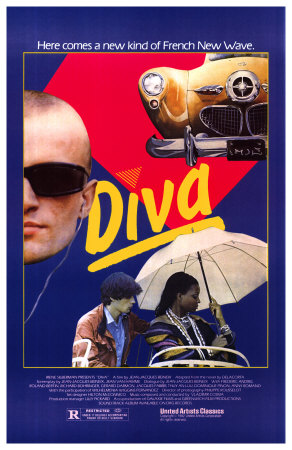Movies |
Diva
directed by Jean-Jacques Beineix
By
Published: Jun 20, 2022
Category:
Drama
I was teaching screenwriting at New York University when “Diva” reached New York theaters.
Some of my students saw it.
“This one’s for you,” they said.
No kidding. The feature debut of Jean-Jacques Beineix, “Diva”— released in this country in 1982 — was unlike anything I’d ever seen. First, it was a reach back to the jaunty films of the French “New Wave.” At the same time, it was a rule-breaker, mixing opera with techno, Society with punk, chic with coarse, thriller with spectacle. And was it ever stylish! Every frame was drenched in color and attitude — almost singlehandedly, “Diva” launched a style of French filmmaking called “cinema du look. “
A film this self-assured, this exotic, this original — it gets noticed. In France, “Diva” played for a year and won César awards for Best Music, Best Cinematography and Best Directorial Debut. (To stream the movie — with subtitles — on Amazon Prime, click here.
In New York, “Diva” was controversial. Pauline Kael, writing in The New Yorker, found it delicious visual candy from a director born to make movies. In The New York Times, Vincent Canby couldn’t have been more sour:
“Diva” is an empty though frightfully chic-looking film… Though it means to be a romantic suspense-thriller, it has the self-consciously enigmatic manner of a high-fashion photograph, the kind that’s irresistible to amateur artists who draw mustaches on the perfectly symmetrical faces of pencil-thin models in sables.
Translation: This film is way too cool for me.
But just cool enough for me. I got an assignment from Esquire Magazine, jumped on a plane to Paris and was soon sitting under the pin lights of Chiberta, having dinner with Jean-Jacques Beineix. (Alas, my piece never ran. Beineix was about to release his next film, “The Moon in the Gutter,” and it was such a pretentious bomb that he was considered a one-hit wonder.)
So what’s the story?
Jules, a young motorcycle messenger, loves opera — and is obsessed with Cynthia Hawkins, an opera singer who refuses to record. One night, he takes his Nagra to the opera and secretly records her (Cynthia is played by a real singer, Wilhelmenia Wiggins-Fernandez) performing an aria from Catalani’s opera “La Wally.” Beineix takes his time here — he tunes us to the messenger’s frequency so we can better appreciate the genius of the singer.
The bootleg Jules makes is not the only bootleg made in Paris that night. A prostitute records a tape implicating the chief of police — and, as she flees, drops it in Jules’ motorcycle bag. And then there is the scary duo that wants Jules’ tape so they can release it as a CD.
With that, we’re off — everybody’s after the innocent messenger. A rich, eccentric helper will appear who will charm Jules with his Zen pronouncements. There will be a Lolita-like Vietnamese girl. There will be sinister props, a vintage creamy-white Citroën 11CV, a light house and a great chase through the Metro.
But best of all is the burgeoning relationship between Jules and a star who confesses, “I’ve never heard myself sing.” Their relationship is not quite a love story, but it’s a beauty to watch — and in a classic scene, they walk through a Paris that’s never been lovelier.
Does “Diva” hold up, all these years later? Not entirely. The Zen hero’s just too good to be true. But the look of the film, its use of music, the way Beineix films Paris — these triumphs were unprecedented then and remain unequaled today. If you’re in the mood to wallow in style and beauty, look no further.


